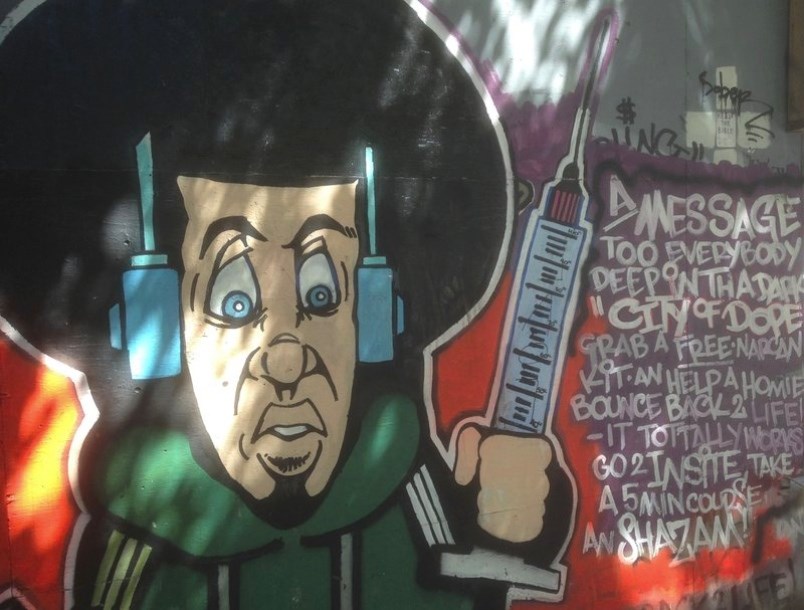While workers in Vancouver’s embattled and poverty-stricken Downtown Eastside fear the potential for a COVID-19 outbreak among the neighbourhood’s addiction and ill, B.C. rehabs and detoxes are working to keep safe those already fighting back.
Indeed, addictions treatment is among services Victoria deemed essential as the health emergency began.
The Salvation Army is at ground zero in much of the work – operating facilities such as Vancouver Harbour Light at Cordova and Main and Belkin House just outside Gastown.
Spokesman Mike Leland said in a news release staff are working “to ensure that vulnerable individuals are being served. Among the highest at risk are the homeless, the elderly and those affected with mental health illnesses and addictions.
“People living on the streets and the elderly often have compromised immune systems and pre-existing health conditions.”
Further up Main Street, Vancouver Coastal Health’s (VCH) Vancouver Detox Centre remains open and accepting clients.
“They’re taking both community referrals and referrals from hospitals and emergency rooms,” VCH spokesperson Matt Kieltyka said. “Clients are screened for COVID-19 symptoms and there are enhanced cleaning, infection control practices and physical distancing in place to reduce the potential risk to staff and clients.”
Further from the city core, Together We Can Addiction and Treatment Society operates facilities in Vancouver and transitional housing programs operating across Metro Vancouver and in Victoria.
Spokesman David Penny said clients took time to adjust to the lockdown but have settled in.
“Everyone is looking out for everyone and pitching in to help make the spaces safe for everyone. Clients know to wear PPE gear when needing to leave the facility for unavoidable appointments and/or emergencies,” he said. “Clients are finding that during the lockdown they are actually focusing more on their recovery and remembering why they are there.”
“The issue of visiting restrictions are being felt by clients just as in the rest of the population,” he said. As it is for everyone else, the issue is health protection.
“In-person visits are no longer allowed,” Penny said, noting clients have embraced technological solutions for keeping contact with others. “While it is in no way a replacement for physical touch, it definitely eases the spirits.”
Also for health protection, cleaning and sanitizing has become a high priority for both facilities and incoming items such as food.
And, that extends to screening incoming clients.
“Together We Can is a licensed facility through Vancouver Coastal Health. VCH has provided us with a screening tool,” Penny said. “Together We Can has taken it one step further, having TWC’s potential patients screened by a physician before entry. Any clients who are currently displaying symptoms are not accepted for the safety of the treatment population and our staff.”
Incoming patients are also subject to isolation before entering a main facility.
“Should a test come back positive, the public health officer will take over the positive case and work with TWC to ensure our clients’ and staff’s safety,” Penny said.
The province has found itself handling two, concurring health emergencies with both COVID-19 and the ongoing opioid crisis.
Victoria rose to those challenges March 26, releasing guidelines allowing drug users to take home — and have delivered — prescribed medications as alternatives to poisoned street drugs. Health care providers are able to get safe, prescription alternative medications such as hydromorphone and dextroamphetamine into the hands of drug users not in a treatment program, or who regularly visit a doctor.
The guideline’s focus is not to treat drug users, but to support them.
At TWC, clients receiving opioid agonist or replacement therapies such as methadone or suboxone continue to be supported by doctors via videoconferencing.
Further afield, Nanaimo’s Edgewood treatment centre also continues work under modified conditions.
Executive director Dr. Christina Basedow said the transition to a new way of functions was difficult at first for both staff and clients.
“The patients have actually done really well because we implemented such strict protocols really early on,” she said.
Indeed, she said, Edgewood has seen a decrease in the number of patients wanting to leave treatment.
But she added, intakes have also gone down.
“We have very strict admissions protocols for the safety of our patients and staff,” Basedow said.
Basedow, who leads a support group for staff during the crisis, said staff do COVID check-ins with patients and also have a COVID task force running to keep things smooth.
However, there has been an impact on outpatient services, she said, with support groups moving online
@jhainswo



